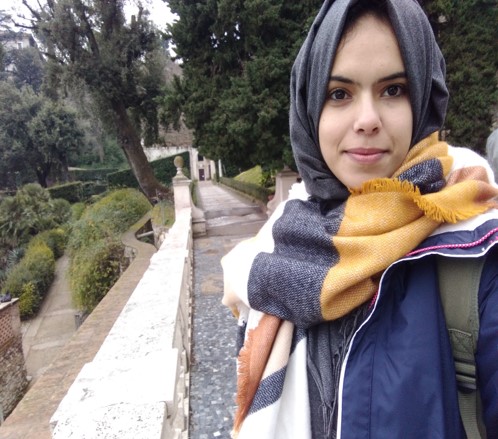Jihane El Mahdi

Personal Bio
Where do you call home Jihane? Can you describe it?
When I think about my home country I immediately think of food. Now that I am trying to find a way to describe it, I could almost smell this incredible big clay plate full of well decorated couscous. Yes I come from Morocco, a north African Arab/Berber country combining the charm of the sea, mountains and desert. The culture in Morocco is as diverse as the landscape; crossing the country you will enjoy different languages, different traditional clothing, diverse delicious food, but the same welcoming spirit. EL JADIDA for example, the small coastal city where I come from; is known for the nice weather, the many beautiful beaches, fresh fish, a special seven types of vegetables couscous, and pumpkin! Yes, the fact that we grow different varieties of pumpkin in my region got everyone who meets me for the first time to say the famous line: Oh, you come from the pumpkin land!
What are some of your personal interests and hobbies?
As for what I enjoy myself about my city, I would say long calm evening walk by the cost. But what I also enjoy is the times I go away from that city, going close or far does not matter, as long as I travel! Travelling is definitely my number one joy. I grew up having yearly family road trips to discover wild places of Morocco, and I cannot stop ever since. I travel whenever I get the chance to, and I carry the dream of visiting the world.
What is your biggest personal achievement so far?
Now for my academic side, I had four interesting years in the Agronomic and veterinary sciences institute in Rabat, where I specialized in crop production. This was followed by a two years MSc in Organic agriculture from CIHEAM Bari as part of a double degree program. Currently, I am doing my PhD in Wageningen university in the Netherlands as part of the FertiCycle project. My biggest achievements in those years were my both degrees, starting a PhD in my dream university, but also the many travels I got to do, and the interesting international friends I made.
Research Project
What is the title of your PhD project? Can you explain it to a non-academic?
My project is about “Improving fertilising properties and reduction of emissions from dairy excrements by novel manure management strategies”. Simply said; by this project I want to contribute to solving two major problems of a long used organic fertiliser: Gaseous emissions and the nutrients value of dairy manure.
Greenhouse gases (methane, nitrous oxide and carbone dioxide) and ammonia emitted to the environment are a serious drawback of managing dairy manure in the aim of using it as fertiliser. Weather at storage or soil application level, the currently used management strategies do not take into consideration the whole picture, and still result in at least one of the down sides (the emission of a harmful gas, or the low availability of a plant essential nutrient). For example, if we decide to apply anaerobic digestion to the manure in order to reduce methane emissions in storage, we would on the other side increase the emissions of ammonia and nitrous oxide in storage and after application to the soil. This is an example of what I define in my research as pollution swapping caused by a management strategy of manure. The solution I will be exploring is the use of an integrated strategy designed by careful investigation of pollution swappings and what drives them. The designed system was previously proved effective by model studies, and I am currently working on experimental studies to validate those results.
What drives your interest in bio-based fertilisers?
I am very excited about this research because I am aware of the importance of manure as an organic fertliser. I got originally intrigued by this field when I was learning about sustainable soil fertility management and circular farming, and discovered how animal manure can be beneficial to the soil in so many levels and serve circularity in the farm. When I knew that we still cannot call it sustainable because of mainly the problems I am trying to solve in my research; I wanted to join the challenge of solving that!
The International Training Network and Marie Curie Program
Describe your experience with the FertiCycle ITN so far?
My experience so far with FertiCycle ITN is definitely positive! Although the restricted options due to the pandemic, we succeeded to get acquainted quite well to a large community of researchers in the field, including the ESRs, and build good collaborations. We also attended few courses and a winter school gathering many other related ITNs. That gave us a broader picture on ongoing European research about bio-based fertilisers, which I personally appreciated very much.
What would you say are the benefits of the Marie Sklodowska-Curie Doctoral Fellowship?
I would say the most relevant benefits of the Marie Sklodowska-Curie Doctoral Fellowship is the networking and organization. Having the opportunity to exchange with 14 other ESRs working on related topics, and with supervisors that are references in the field is certainly a great facilitation for a PhD to create a good network. It is also an important benefit if you have already a group with organized tailored courses and academic events.
How has the experience traveling abroad for this program been for you?
I would say my experience of travelling to the Netherlands for this program was quite smooth. Wageningen University partners make sure you arrive with minimum administrative load, and accompanies new students to get started with the Dutch system. Wageningen is a small city but with more nationalities than I ever saw, so you do not feel much as a foreigner here, but part of an open international community. I enjoyed it so far, and I hope the four years to come will be full of experiences and challenges.
